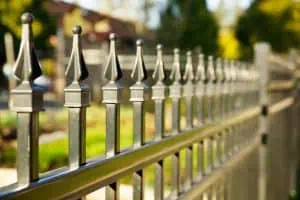What Type of Metal Fencing Outdoors Is Right For Your Home?
Whether you’re building a new property or updating an existing one, you’ll want to pick the best type of metal fencing outdoors. After all, a good fence can increase the curb appeal of your home and keep your family safe.
(Looking for a wood fence contractor? Contact us today!)

Wrought iron: Usually built to fit the contours of your yard, wrought iron fences can add architectural detail and even a classic look. However, they can also be expensive and require professional installation. Luckily, more affordable alternatives such as cast iron and aluminum offer the strength of wrought iron without a hefty price tag.
Steel: Although steel is not as strong as wrought iron, it is more durable and less expensive. It is also a great choice for homeowners who are concerned about their budgets and need a fence that’s not subject to termites, weather, or fire.
Galvanized steel: A great alternative to rusty, old-fashioned wrought iron, galvanized steel is resistant to corrosion, and it’s also environmentally friendly. Corrugated fences made with this material are a popular option for homeowners who need privacy and a sense of security.
Aluminum: Unlike wrought iron, aluminum is a natural rust-resistant material. This makes it the perfect fence for homes and businesses near coastal areas, especially if you have an outdoor pool on your property.
Prefab: Often sold at home centers and fence suppliers, tubular aluminum panels are held together with screws, but they can be heavy (about 11 pounds each) and may need multiple trips to haul them home. LOOK FOR: Uniform welded joints, an option that looks better than fixed picket tops; panel brackets that rest on the post’s inside face are the least obvious.
Hollow-steel: Usually welded or joined with rivets, hollow-steel panels weigh 50 pounds each, but fewer posts are required. The panel’s smooth top rails are popular around swimming pools.
Custom: If you’re willing to pay a premium, custom-fabricated panels can be made from a mix of materials and manufacturing methods. For example, a fabricator might mix cast-iron details with hollow-steel pickets to save on materials costs.
Corrugated: A DIY-friendly alternative to a traditional woven wire fence, corrugated metal is an eco-friendly and cost-effective option. This is a great fence to combine with wood for an eclectic look that’s both attractive and secure.
Gabion: Another innovative and stylish option for residential and commercial properties, gabion fencing uses wire mesh baskets filled with rocks or stones to create a durable barrier. It’s a great solution for landscaping and erosion control projects, too.
Natural stone: Adding an elegant and unique accent to your yard, natural stone fences are a fantastic choice for properties that have a lot of character and charm. These fences add a natural element to your property and provide privacy without the added cost of traditional fences.
Composite: If you’re looking to blend your fencing with other landscaping, consider a composite fence that incorporates wood and metal elements. These fences are durable, low-maintenance, and can be painted to match your home’s exterior color scheme.

